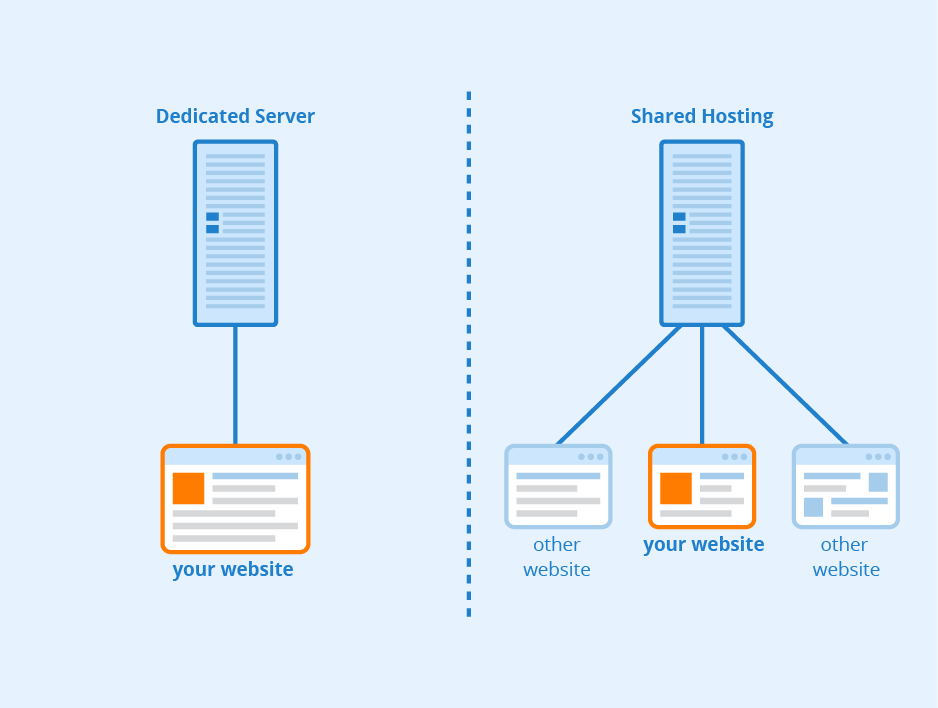In today’s dynamic digital landscape, a website is an indispensable tool for businesses, organizations, and individuals alike. But when it comes to hosting a website, the decision to choose the right web hosting service is not to be taken lightly. Web hosting, the process of storing and making a website accessible to the vast expanse of the World Wide Web, is a multifaceted concept that warrants a closer look. So, let’s embark on a journey to unravel the complexities of web hosting and decipher its fundamental principles.
Some Best Web Hostings:

At its core, web hosting is the service that empowers individuals and organizations to unleash the full potential of their websites to users on the internet. It involves the intricate interplay of storing website files and data on a specialized computer known as a web server. When users enter a website’s domain name, such as www.example.com, in their web browser, it sets off a chain of events. The browser sends a request to the web server hosting that website, which diligently delivers the website’s files to the user’s device, culminating in the awe-inspiring ability to view the website in all its glory.
Get The Best International Hosting from Hostinger with a Free Domain: Click Here
Untangling the Web of Web Hosting Types
Web hosting comes in various flavors, each with its unique features, advantages, and limitations. Let’s delve into some of the most common types of web hosting and demystify their intricacies:
- Shared Hosting: Picture a bustling neighborhood where multiple websites reside on the same server, sharing resources like CPU, RAM, and storage space. That’s shared hosting for you – an affordable option that fosters a sense of camaraderie among websites. However, it may come with some trade-offs in terms of performance and customization, as the resources are divvied up among the residents of the server.
- VPS (Virtual Private Server) Hosting: Enter the realm of virtual partitioning, where a physical server is carved into multiple virtual servers, each with its dedicated resources and an air of autonomy. VPS hosting offers more scalability and customization options compared to shared hosting, allowing websites to flourish with their own unique persona.
- Dedicated Hosting: Imagine having an entire server at your beck and call, exclusively allocated to cater to your website’s every whim and fancy. That’s dedicated hosting for you – a playground for websites with grand ambitions. With maximum control, performance, and security, dedicated hosting is a force to be reckoned with. However, it may come with a heftier price tag, suited for websites that demand uncompromising excellence.
- Cloud Hosting: Picture a celestial network of interconnected servers that work in unison to host websites, offering unparalleled scalability and flexibility. Welcome to the realm of cloud hosting, where websites can harness on-demand resources and pay only for what they use. It’s a cost-effective option for websites with varying resource needs, perfect for those who dare to dream big.
- Managed WordPress Hosting: Amidst the web hosting galaxy, there exists a niche for WordPress aficionados. Managed WordPress hosting is tailored specifically for WordPress websites, with optimizations galore. From automatic updates to enhanced security and performance optimizations, it’s a haven for WordPress enthusiasts seeking the utmost finesse.
Web hosting is a service that allows individuals and organizations to make their websites accessible on the Internet. There are several key features of web hosting that are essential for understanding how it works and choosing the right hosting provider for your website.
People from Bangladesh can buy hosting using Bkash, Nagad payment from BT Max Host (Click Here)
Let’s crack the code and explore these key features:
- Unleashing the Power of Server Resources: The backbone of any website lies in the server resources provided by the hosting provider. The CPU (Central Processing Unit), RAM (Random Access Memory), and storage space are the key ingredients that determine the performance and reliability of a website. The processing prowess of the CPU, the ability of the RAM to handle concurrent visitors, and the storage space for data storage are crucial factors that impact the smooth and efficient functioning of a website. Grasping the intricacies of these server resources offered by the hosting provider is imperative to ensure a website that performs at its peak.
- Navigating the Bandwidth Maze: Bandwidth, the conduit for data transfer between the server and visitors’ browsers, is a crucial element that influences the loading speed of a website and the number of simultaneous visitors it can accommodate. Higher bandwidth translates to faster loading times and an enhanced user experience. Understanding the bandwidth limits provided by the web hosting provider is vital to ensure that the website can handle the anticipated traffic without encountering any performance hiccups.
- Mastering the Art of Domain Management: The management of domain names is a critical feature of web hosting that involves registration, transfer, and administration of domain names. A domain name serves as the web address through which visitors access a website. Domain management encompasses domain registration, domain transfer, domain renewal, DNS (Domain Name System) management, and domain privacy. Gaining a deep understanding of the domain management features offered by the web hosting provider is essential to align them with the requirements of the website.
- Unraveling the Mysteries of Control Panel: The control panel, a web-based interface, acts as the nerve center for managing various aspects of a website hosting account, including email account setup, database management, application installation, and server configuration. Common control panel options include cPanel, Plesk, and custom-built control panels. A user-friendly control panel simplifies the management of the website hosting account, even for users without technical expertise.
- Cracking the Code of Website Security: Safeguarding a website from cyber threats and protecting the integrity of data and visitor information is of paramount importance. Web hosting providers may offer an array of security features, such as SSL (Secure Sockets Layer) certificates for data encryption, firewalls for defense against malicious attacks, regular backups for data protection, and malware scanning for the detection and removal of harmful software. Understanding the security features provided by the web hosting provider is crucial to ensure the fortification of the website against potential threats.
- Unraveling the Labyrinth of Technical Support: Reliable technical support is a cornerstone of any web hosting service. Different levels of technical support, such as 24/7 live chat, email, phone support, or a comprehensive knowledge base for self-help, may be offered by hosting providers. Understanding the technical support options provided by the web hosting provider and ensuring that they align with the requirements of the website is vital to receiving timely assistance in case of any issues.
- Unlocking the Potential of Scalability: Scalability, the ability of a web hosting service to accommodate the growth of a website in terms of traffic, resources, and features, is a critical aspect. A scalable web hosting service empowers users to seamlessly upgrade or downgrade their hosting plan based on the evolving needs of the website.
People from Bangladesh can buy hosting using Bkash, Nagad payment from BT Max Host (Click Here)

Conclusion
In a nutshell, web hosting is like the backbone of your website, making it possible for people to access it online. It’s important to know the key features of web hosting, such as server resources (like processing power and storage), bandwidth (which affects loading speed), domain management (registering and managing domain names), control panel (for managing various aspects of your hosting account), security features (like SSL certificates and backups), technical support (for getting help when you need it), and scalability options (for accommodating future growth).
Considering factors like performance, reliability, security, ease of management, and scalability is crucial when choosing a web hosting provider for your website. By having a clear understanding of these key features, you can make an informed decision and ensure that your website runs smoothly, securely, and efficiently on the Internet. It’s like building a strong foundation for your website to thrive online!



